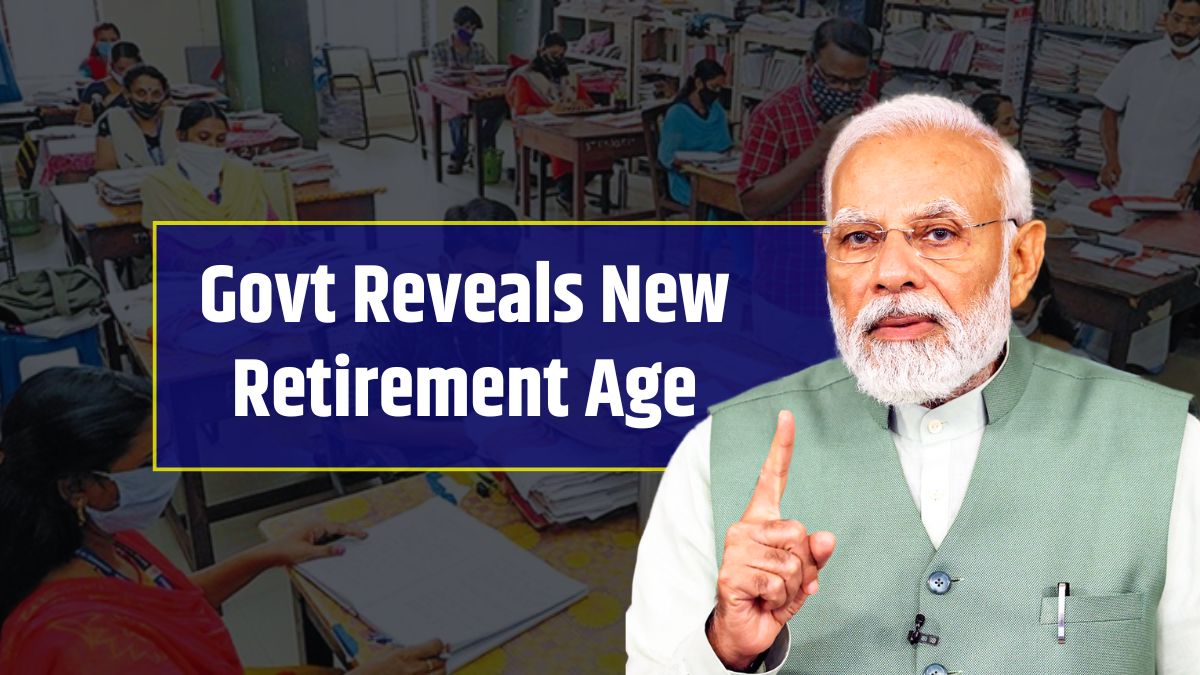New Retirement Age Rules – The central government has recently made some changes to the retirement age rules for its employees. This decision has been taken to manage human resources more efficiently and to keep pace with changing demographics and economic needs. These updates will directly affect a large number of central government workers and will have long-term effects on promotions, pensions, job vacancies, and overall workforce planning.
Let’s break down what’s new, what remains the same, and how it all impacts current and future employees.
What Is the New Retirement Age?
As per the latest policy updates, the standard retirement age for most central government employees remains at sixty years. However, the age limit has been revised for certain categories where expertise is highly valued, such as medical professionals and scientists.
Here are the key points to know:
- The retirement age for general government employees stays at sixty.
- For doctors under the Central Health Services, the retirement age has been raised to sixty-five.
- Scientists working in research and development institutions will now retire at sixty-two.
- Teaching staff in central universities continue to retire at sixty-five.
- There are proposals to extend the retirement age to sixty-two for other categories, especially those without pension benefits, but these are still under review.
This approach seems to focus on retaining skilled professionals longer, especially in sectors where experience makes a big difference.
Revised Retirement Age Table
Let’s take a look at the updated retirement age by category:
- General Central Government Employees: No change, remains at sixty
- Doctors (Central Health Services): Increased from sixty-two to sixty-five
- Scientists in R and D: Increased from sixty to sixty-two
- University Professors: No change, remains at sixty-five
- Judges: Proposed change from sixty-two or sixty-five to sixty-five or sixty-seven, still under discussion
- IAS, IPS, IFS Officers: No change, remains at sixty
- Defence Civilian Staff: No change, remains at sixty
These changes are designed to balance retaining expertise while managing retirement benefits and job creation.
Why These Changes Matter
The government believes that extending the retirement age for certain professionals will lead to better project continuity and less burden on the pension system in the short term. On the other hand, there are some concerns too.
Here’s the upside:
- Experienced professionals stay longer, offering better guidance and leadership.
- It reduces the pressure on pension payouts temporarily.
- Key projects benefit from the continuity of experienced staff.
But there are also some challenges:
- Junior employees may see slower promotions due to seniors staying on longer.
- Fewer openings for young job seekers entering government service.
- The need for regular performance evaluations becomes more critical.
What About Performance-Based Retirement?
Even though retirement ages have been revised, performance-based provisions are still active. Under the current rules, employees who are not performing well or are found to be lacking integrity can still be retired early.
As per Fundamental Rule 56 sub-rule j and Rule 48 of the Central Civil Services Pension Rules, employees can be compulsorily retired either after completing thirty years of service or at the age of fifty, depending on their performance.
This means that just reaching the retirement age does not automatically guarantee an extension. Efficiency and integrity still play a big role in whether someone can continue working beyond a certain age.
How This Impacts Pension and Post-Retirement Benefits
An increase in retirement age will also have an effect on pension and other post-retirement benefits.
Here’s how:
- Start of pension: This may now begin at sixty-two instead of sixty for some categories.
- Monthly pension amount: It could increase because the last drawn salary would be higher with additional service years.
- Gratuity and leave encashment: These are also likely to be higher due to extended service.
- NPS or EPF contributions: These will now continue for more years if the retirement age is extended.
- Healthcare benefits: Coverage under government health schemes will continue as before.
Are More Changes Coming?
Yes, there are a few proposals that are still being discussed:
- Raising the retirement age for all central employees to sixty-two.
- Linking retirement with physical fitness and annual performance reviews.
- Bringing more consistency between retirement rules of central and state government employees.
- Adjusting pension calculations in the National Pension Scheme based on new age limits.
What Are the States Doing?
Each state has the freedom to adopt or ignore these new rules. Here’s a quick look at how some states are responding:
- Uttar Pradesh: Considering increasing the retirement age.
- Maharashtra: Keeping an eye on central developments.
- Tamil Nadu: No change for now.
- Karnataka: Likely to follow central government rules.
- Punjab: Facing opposition from unions.
The government seems to be taking a balanced approach by extending retirement age only for roles where experience is essential. While this helps in retaining talent, it also raises concerns around fewer job openings and slower promotions for others. Employees should stay updated through official channels and reach out to their department or HR team for personal implications.
These new changes are part of a broader effort to make the government workforce more efficient while also addressing rising life expectancy and longer working years. More clarity is expected as the proposed rules are debated and implemented.






